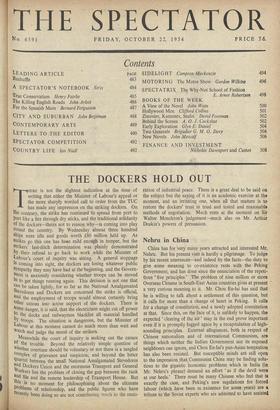THE DOCKERS HOLD OUT
TIMRE is not the slightest indication at the time of writing that either the Minister of Labour's appeal or the more sharply worded call to order from the TUC has made any impression on the striking dockers. On the contrary, the strike has continued to spread from port to Port like a fire through dry sticks, and the traditional solidarity of the dockers—theirs not to reason why—is coming into play round the country. By Wednesday almost three hundred ships were idle and goods worth £80 million held up. As strikes go this one has been mild enough in temper, but the strikers' last-ditch determination was plainly demonstrated by their refusal to go back to work while the Minister of Labour's court of inquiry was sitting. A general stoppage is coming into sight, the dockers are losing whatever public sYmpathy they may have had at the beginning, and the Govern- ment is anxiously considering whether troops can be moved in to get things running again. This decision is not one that can be taken lightly, for so far as the National Amalgamated Stevedores and Dockers are concerned the strike is official, and the employment of troops would almost certainly bring Other unions into active support of the dockers. There is some danger, it is said, that the electricians might cut off power to the docks and railwaymen blacklist all material handled by troops. The situation is dangerous, but the Minister of Labour at this moment cannot do much more than wait and Watch and judge the mood of the strikers. Meanwhile the court of inquiry is seeking out the causes Of the trouble. Beyond the relatively simple question of Whether overtime should be voluntary or not there is a tangled Complex of grievance and suspicion; and beyond the bitter quarrel between the small National Amalgamated Stevedores and Dockers Union and the enormous Transport and General Workers lies the problem of closing the gap between the rank and file and the remote leadership of Transport House. But Ulm is no moment for philosophising about the ultimate problems of relationship, and the public figures who have recently been doing so are not contributing much to the resto- ration of industrial peace. There is a -great deal to be said on the subject but the saying of it is an academic exercise at the moment, and an irritating one, when all that matters is to restore the dockers' trust in tried and tested and reasonable methods of negotiation. Much rests at the moment on Sir Walter Monckton's judgement—much also on Mr. ArthUr Deakin's powers of persuasion.


































 Previous page
Previous page